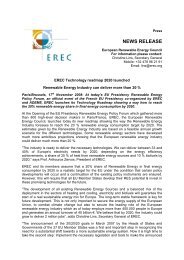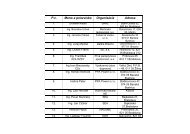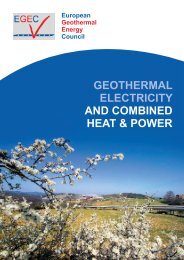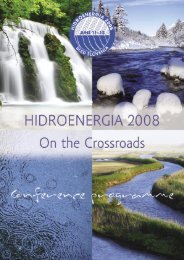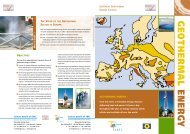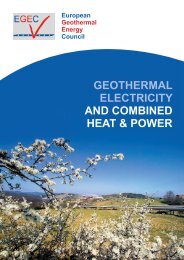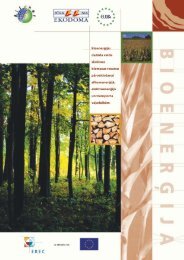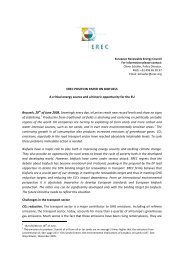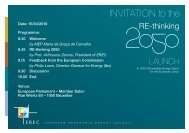CTO Assessment - European Commission
CTO Assessment - European Commission
CTO Assessment - European Commission
Create successful ePaper yourself
Turn your PDF publications into a flip-book with our unique Google optimized e-Paper software.
POLAND<br />
from coal to biomass from<br />
green urban areas<br />
EC BALTIC RENEWABLE ENERGY CENTRE<br />
Renewable Energy Centre of Excellence and Competence in Poland (RECEPOL)<br />
ul. Reduta Zbik 5 • 80 - 761 Gdansk • Poland<br />
Tel./Fax.: +48 58 301 57 88 • E-Mail: gdansk@ecbrec.pl • Website: www.ecbrec.pl<br />
A wood fired heating system has been implemented<br />
as a pilot project under the Joint<br />
Implementation mechanism of Kyoto. The<br />
realizations that aimed at replacing the<br />
two old coal-burning tanks started in<br />
1998 in Poland as a cooperation project<br />
between the Dutch Government (who was<br />
also the main financing body) and the<br />
Polish Government with a cleaner source:<br />
biomass.<br />
The actors involved were: Biomass Technology<br />
Group B.V. (BTG) from the Netherlands<br />
was the coordinator of the project,<br />
KARA Energy Systems from the Netherlands<br />
supplied the boiler, EC Baltic Renewable<br />
Energy Centre/Institute for Building<br />
Mechanization and Electrification of<br />
Agriculture (EC BREC/IBMER) from<br />
Poland was a local coordination and the<br />
Municipal Company of Communal Management<br />
of Jelenia Gora was the project<br />
partner and the local investor.<br />
Main motivations<br />
The reason for the project was the replacement<br />
of the two old, inefficient coal burning<br />
tanks that belonged to the Municipal<br />
Waste Disposal Company. Due to the fact<br />
that the same company is responsible for<br />
the maintenance of green areas, the concept<br />
arose to replace the low efficiency<br />
coal-burning tanks with a wood fired heating<br />
system that would utilise waste wood.<br />
The plant is located in the area belonging<br />
to the Municipal Waste Disposal Company,<br />
which simultaneously is the owner<br />
of the plant, and provides heat to the complex<br />
of greenhouses that cover an area of<br />
1,200 m 2 .<br />
Project details<br />
In Jelenia Gora and its neighbourhood,<br />
waste wood from the maintenance of green<br />
areas, to be utilised immediately for energy<br />
production purposes is 700 m 3 and<br />
the entire technical potential is equal to<br />
2,540 m 3 . Directly, it refers to the potential<br />
of 2,100 and 7,500 GJ respectively.<br />
Such a potential equates to a possible energy<br />
production capacity of 350 and 1,250<br />
kW respectively.<br />
The waste wood is shredded in the storage<br />
place and then undergoes the process of<br />
pre-drying. After some time it is transported<br />
to another storage place for longterm<br />
storage (a few months). One of the<br />
storage places houses the wiping feeder<br />
installed in the floor of the storehouse and<br />
screw feeder, which automatically feeds the<br />
wooden chips directly to the tank. The storage<br />
house of a capacity of 50m 3 , depending<br />
on the humidity of the fuel and the<br />
ambient temperature and ensures constant<br />
heating for the period of c.a. 24 – 48 hours.<br />
An example of “Joint Implementation”<br />
The basic idea behind “Joint Implementation”<br />
is the decrease of carbon dioxide<br />
(CO 2<br />
) emission reduction costs (EUR per<br />
ton CO 2,<br />
). As this is often more expensive<br />
to do in the Western <strong>European</strong> countries,<br />
the idea of “Joint Implementation” for a<br />
project in one of the Eastern <strong>European</strong><br />
countries became possible to realise. The<br />
Dutch government finances the lion share<br />
of the project and assists the receiving country<br />
(Poland) in the implementation of its<br />
CO 2<br />
reduction projects, in return for CO 2<br />
-<br />
credits. The estimated share of emission<br />
reduction units between projects partners<br />
governments equals: the Netherlands 55%,<br />
Poland 45%.<br />
As a result, the Polish and Dutch government<br />
agreed on a bilateral co-operation in<br />
the field of joint abatement of greenhouse<br />
gases. A wood fired heating system has<br />
hence been implemented in Jelenia Gora.<br />
Financing<br />
The project was financed under the umbrella<br />
of the Dutch Programme for Bilateral<br />
Co-operation with the Dutch Ministry<br />
of Economic Affairs by Government<br />
Agency SENTER and by virtue of the agreement<br />
signed among the Polish and Dutch<br />
Governments.<br />
Total cost of the investment was 928,160<br />
PLN (206,258 EUR). The infrastructure<br />
prepared for the purposes of the technology<br />
application included: tank by KARA<br />
with equipment, stack (purchase and<br />
mounting), “moving floor” feeder additional<br />
grid connection, storehouse for<br />
wooden chips including drying system located<br />
under the floor, air solar collector,<br />
shredder, tank installation (mounting and<br />
crane), documentation, other (truck loader,<br />
roads and squares)<br />
The Dutch government had financed the<br />
purchase of the boiler, the preparing of all<br />
investment: technical project, the feasibility<br />
study and the monitoring system. The<br />
Polish investor had financed mounting<br />
costs and the costs of building other equipment<br />
e.g. floor drying channels.<br />
Environmental benefits<br />
The following benefits were realised by the<br />
installation of the biomass technology: savings<br />
of 220 tones of coal by its replacement<br />
with biomass, abandonment of the<br />
storage of 385 tones of waste wood at the<br />
landfill, and thus, reducing the greenhouse<br />
gases emission resulting from the decay of<br />
organic material, and a decrease in the fees<br />
for using the environment. It was estimated<br />
that throughout the period of the<br />
project (15 years), the total reduction of<br />
carbon dioxide emissions would be 21 thousand<br />
tones of CO 2<br />
equivalent.<br />
86 <strong>CTO</strong> - Showcase




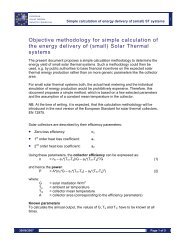
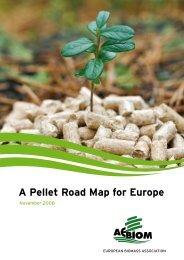
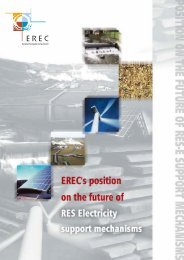
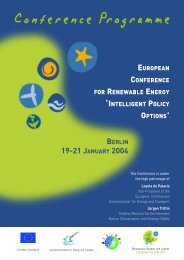
![Energy [R]evolution - Greenpeace](https://img.yumpu.com/47174859/1/184x260/energy-revolution-greenpeace.jpg?quality=85)
